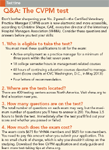Why DVMs get CVPMs
Practicing good medicine isn't the only way to add value to your practice-proper management plays a huge role as well. Find out more reasons veterinarians are becoming certified practice managers.
When Dr. Beth Fritzler, CVPM, and her husband, Dr. Timothy Kraabel, bought Lien Animal Clinic in Seattle, they needed help. Neither had any real business experience or training and while their new practice was well established, it still needed some work when it came to management.
"The first couple years were kind of rough as far as ownership goes," Dr. Fritzler says. "We realized pretty quickly that we needed to learn more about business, finance, human resources, and inventory."
More veterinarians like Dr. Fritzler are becoming certified veterinary practice managers (CVPMs), according to Christine Shupe, CAE, executive director of the Veterinary Hospital Managers Association (VHMA). There are currently 325 CVPMs in the country and 22 (about 7 percent) of them are licensed veterinarians, she says.
"It's a trend that we're seeing because more doctors are realizing the importance of the business aspect of their practice," Shupe says.
Dr. Fritzler realized this early on in her career and started attending medical and management continuing education courses at local and national veterinary conferences. Before she knew it, she was enrolled in classes offered by the American Animal Hospital Association (AAHA) and Purdue University College of Veterinary Medicine.

Q&A: The CVPM test
"Going through the process of preparing to take the exam and completing the requirements made me a much more well-rounded manager," Dr. Fritzler says. "I could have studied those things on my own, but realistically I probably wouldn't have."
Once she started actively pursuing the certification, it took Dr. Fritzler a little more than one year to get her CVPM. She says it did take time, but she was able to make improvements to her practice as she was learning new management skills.
"When I reviewed OSHA rules I learned there were a bunch of things we were supposed to be doing," Dr. Fritzler says. "When I studied inventory, I thought, 'Oh gosh, we should be doing this.'"
As the practice grew, so did the need for excellent practice management skills. Now Dr. Fritzler practices one or two days as a veterinarian but devotes the majority of her time to practice management. This flexibility in her schedule has helped improve her family life as she and her husband have three kids. Last spring, the two owners hired an additional practice manager with experience in one of Dr. Fritzler's weaker areas: marketing. The two usually work as a team but when the other practice manager went on maternity leave for a number of months, Dr. Fritzler was thankful she had gone through the CVPM process. She took back all of the management duties without being overwhelmed.
"Veterinary school doesn't prepare you to manage a practice and it shouldn't," Dr. Fritzler says. "It teaches you how to do medicine but not how to conduct interviews, hire employees, or comply with tax laws."
Many veterinarians need to manage their practices better, according to Dr. Karen Felsted, CPA, MS, CVPM. She says veterinarians need more management training, and the CVPM program sets the framework for what they need to know about client service, scheduling, and so on.
"If you're running your practice better, your team will notice and appreciate it," Dr. Felsted says. "Plus, doing a better job of marketing can lead to increased visits and a more financially strong practice."
This could mean raises for your veterinary team members. However, it's not just about increasing the bottom line for you and your team's benefit, Dr. Felsted says.
"It's hard to practice good veterinary medicine if you don't make enough money to manage your practice well," she says.
Dr. Aron Tallent, CVPM, owner of Conway Animal Clinic in Conway, Ark., was certified in practice management 20 years into his veterinary career. Now he feels more confident running his practice knowing that he's attained national standards for practice management.
"I'm 64 years old, so texting, emailing, and websites are certainly new for my generation of veterinarians," Dr. Tallent says.
By attending annual VHMA meetings and practice management sessions at CVC Kansas City for the past 30 years, he's been able to create valuable Facebook and Twitter accounts for his practice. He says in today's culture, veterinary practices must have an online presence to stay current and attract new clients.
"Social media has allowed us to have a niche with the younger demographic that we probably would not have otherwise," Dr. Tallent says.
He says getting the certification has actually saved him money in the long run. Now he's able to consult with other CVPMs before making costly mistakes.
Dr. Fritzler agrees that an unexpected benefit of going through the CVPM process was walking away with a network of supportive colleagues to consult with.
"Now if I have an issue with a staff member or project, I have a better network of people I can call up and say, 'Hey, have you dealt with this?'" Dr. Fritzler says. "They can give me some advice and help."